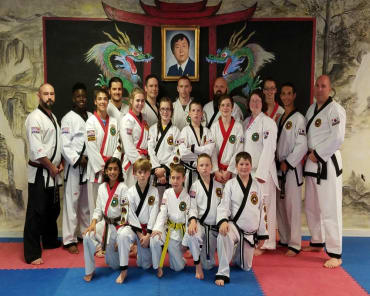
Philosophy of Tang Soo Do
In essence, Tang Soo Do is a way of life. It is an artistic study with two distinctive characteristics.
These are :
1) Physical expression of the human instinct for self-preservation.
2) The spiritual realization that comes with character development.
To put it simply, Tang Soo Do starts with physical development for the purpose of better health and selfdefence, and ultimately becomes a philosophical art in which one discovers their fullest potential in an esoteric sense. With this understanding comes great personal power and spiritual strength or “spirit”.
Seen this way, Tang Soo Do is a paradox. To gain spiritual power, one must master self and conquer physical limitations. These two elements work simultaneously and independently. If anyone truly desires to be a Master of Tang Soo Do, technical achievement alone is not enough. One must transcend techniques, and most importantly, strive to understand nonphysical power, namely the power of spirit. The true Tang Soo Do practitioner is constantly seeking to learn its philosophy while practicing its physical techniques.
The Major Premise of Tang Soo Do philosophy
Even though we practice techniques to defend against physical violence, our ultimate purpose, though sometimes obscured, is to develop strong spirit and self-awareness to supplement our physical skills. Once accomplished, the Tang Soo Do practitioner renders violence and conflict powerless by displaying great personal power. This personal power (also called self-mastery) consists of a mental attitude that is tranquil yet flowing; rigid yet receptive to anything that confronts it. The student attains a state of mind which is able to react intuitively to any situation which may arise. The result is a person who is confident enough to defend against in-justice.
The meaning of “DO” in Tang Soo Do
“DO” in Tang Soo Do literally translates to “way” or “way of life”. However, it means much more than its literal translation. The philosophy of Tang Soo Do and “DO” is synonymous. Broadly speaking, Do means the philosophy road that takes us righteously forward. To better understand this, we will start our study from a historical concept of “DO”.
The concept of “Do” is associated with the famous Chinese philosopher Tao Tze (actual name: Li Er). His beliefs consisted of a set of simple dialectics. These ideas embodied the oriental philosophy of Taoism. Many of Taoism’s valuable principles – healthy living, cultivating one’s temperament, and breathing exercises (Ki Kong) can be traced back to the works of Lao Tze. His essential thoughts are recorded in the Lao Tze, also the Tao Te Ching (classics of morals). In his opinion, it was the law that all things in the universe are in constant motion and never remain inert. The objective world, according to Lao Tze’s belief that these opposites, such as weak and strong, feeble and vigorous, and soft and tough, could transform into each other. He said, “things will reverse when carried to the extreme, and prosperity, at its climax, inevitable gives way to decline. This is the way with nature as well as with man.”
Such ideas of motion and development have led later generations to become active in physical training instead of passive degeneration. The concept of following the law of nature is an important part of Tao Tze’s approach to good health and well-being. He suggested that the human body must follow and adapt itself to the laws of nature in order to thrive and grow. He said “man follows the law of the ‘way’, and the ‘way’ follows the law of nature.” He advocated plain living and abstinence over selfish desire and lust. Enlightened thinkers paid great attention to tranquillity, repose, and self-cultivation to keep fit for a higher life expectancy. This, the ancients believed, would lead to a longer, healthier, and happier life. This way of thinking embodies Lao Tze’s Ideology.
One of Lao Tze’s greatest contributions was his exhortation on the principle of “Prevention First”. His advice was to “anticipate that may grow thorny while they are still easy to manage and do things that become momentous while they are still insignificant”. According to Lao Tze, “nature is a final and ultimate truth.” The universe follows the rule of nature and the way of nature is “DO”
(source: I wish I had more on the Author, my only source is this link: Philosophy of Tang Soo Do)











